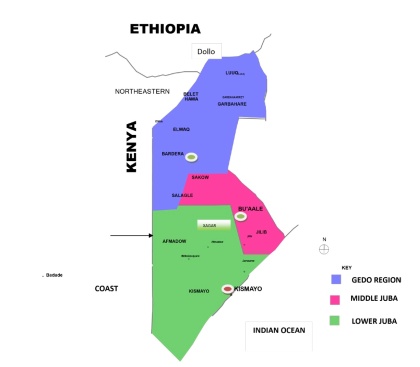 Ahmed Mohamed Islam “Madobe”–elected Jubaland region President at a conference in Kismayo contested by the Somalia Federal Government and other parties but supported by others–reportedly has arrived in Nairobi, Kenya to address the Jubaland issue.
Ahmed Mohamed Islam “Madobe”–elected Jubaland region President at a conference in Kismayo contested by the Somalia Federal Government and other parties but supported by others–reportedly has arrived in Nairobi, Kenya to address the Jubaland issue.
Madobe is likely to meet with Kenyan officials to discuss how to resolve the crisis.
Puntland region President Abdirahman Farole recently held talks in Nairobi days earlier with other pro-Jubaland delegates in a likely bid to encourage Kenyan President Uhuru Kenyatta and Foreign Minister Amina Mohamed to further support a Madobe-led Jubaland.
President Hassan Sheikh Mohamud also recently arrived for talks with Uhuru at Sagana State Lodge outside the capital.
While Uhuru has committed to not “interfering with the domestic affairs of Somalia,” Hassan likely has concerns about the nature of Kenyan support to Madobe’s Ras Kamboni militia, the treatment of SFG officials at Kismayo airport, and the allegations of one source in Kismayo port regarding the role of Kenyan Defense Forces (KDF) in distributing port revenue.
Other media reports suggest that Farole will also meet with Hassan in an effort to “push reconciliation” between him and Madobe.
Though there is speculation that Madobe, Hassan and Farole will meet all together at one point, the prospect of the talks with the three men in the same room differs among sources.
Federalism Ad Hoc
In a recent Jubaland fact-finding mission report, the Intergovernmental Authority on Development (IGAD) recommended “stakeholders in Kismayo to go to Mogadishu and dialogue with the Federal Government regarding the interim regional administration.”
However, the purported meetings in Nairobi between Kenya, Jubaland, Puntland, and SFG delegates reflect an ongoing ad hoc process in how to deal with the federalism issue due to ambiguous constitutional roles and clan/power politics at play.
Mogadishu-based think tank Heritage Institute for Policy Studies recommended both constitution-based and out-of-the-box solutions on Jubaland in its most recent policy document. It called on the Somali Federal Parliament (SFP) to nominate the Boundaries and Federation Commission (via constitutional Article 49[2]) as well as allowing Madobe to lead an interim administration, among other details.
While talks between some critical parties in Nairobi might help peacefully resolve the Jubaland issue, the role of excluded parties as spoilers should not be overlooked. Absent from the Nairobi meetings among other dissenting parties is Barre Hirale–the militia leader seen by some as working with President Hassan’s administration as a check on Madobe’s influence in Kismayo.
Hirale–who recently survived an alleged assassination attempt after a grenade was thrown at his residence in Kismayo–has expressed frustration with President Farole’s efforts to support a Jubaland led by his long-time rival Madobe.
In order to reduce the negative impact of actors not included in Nairobi’s Jubaland discussions, a broader participatory forum agreed upon by all parties in the region is needed.
Any combination of talks that occur in Nairobi hopefully only represent the beginning of future talks in Somalia at an all-inclusive venue.
It is equally important for the SFG and SFP to recognize how a similar crisis could occur in other regions mandated to form a Federal Member State.
As a result, there is a need for the SFG to outline its vision for federalism in a clear document that acknowledges the specific capacities of local/regional communities and the SFG.
The SFG can also delicately encourage local/regional communities to establish open forums for the discussion of their concerns, aspirations, and obstacles regarding the federalism process. This could help to highlight potential flash points that could occur in other regions.
Lastly, the SFP’s constitutional duty to establish the aforementioned federalism commission should be an immediate priority. Like all parliamentary matters, it is bound to be controversial. But, the closest possible common vision for federalism in Somalia cannot be reached without a transparent and credible discussion of serious and sensitive issues among political elites and communities at the grassroots levels.

 Methodology or Misinformation: What’s Driving Dadaab Refugee Camp Numbers Down?
Methodology or Misinformation: What’s Driving Dadaab Refugee Camp Numbers Down?  Analysis: Dadaab Refugees Stopped on Return to Somalia, Raising Repatriation Questions
Analysis: Dadaab Refugees Stopped on Return to Somalia, Raising Repatriation Questions  Mohamud’s U.S. Visit Foreshadows Federalism Debate
Mohamud’s U.S. Visit Foreshadows Federalism Debate  Jubaland Close to Becoming Somalia’s Next State
Jubaland Close to Becoming Somalia’s Next State
Reblogged this on ismailwarsame.